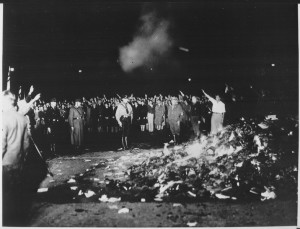
First, I obtained an email from BID Patrol Office Manager Vicky Rappuchi to Kerry Morrison which states:
Steve [Seyler] asked me to send this (attachment) to you. It is the sign-in sheet for those that attended the outreach meeting at our office today.
Steve suggested you may want to delete.
Vicky

Furthermore, keep in mind that as late as October, 2015, Kerry Morrison supplied me with emails from as early as 2008, so it’s not like they’re just deleting their emails on some kind of schedule. This brings us to the second significant event.
At the HPOA Board of Directors meeting on March 17, 2016, Kerry Morrison presented a new records retention policy to the Board for their approval. You can read a transcription of the whole thing below, but the upshot is that they have declared that emails aren’t records, and they’re going to delete them all automatically after ninety days unless they’re specifically retained. The most interesting (and fanciful) bit in the new policy1 is a statement to the effect that “Emails that are official records are subject to the association’s records retention schedule and may be subject to disclosure in response to a request for public records.” This is interesting because, actually, also emails that aren’t official records by their definition are subject to disclosure in response to a CPRA request. It says so in CPRA at section 6252. A public record is there defined as various kinds of “writing” and “writings” are defined as:
…any handwriting, typewriting, printing, photostating, photographing, photocopying, transmitting by electronic mail or facsimile, and every other means of recording upon any tangible thing any form of communication or representation, including letters, words, pictures, sounds, or symbols, or combinations thereof, and any record thereby created, regardless of the manner in which the record has been stored.
It’s pretty well known that laws trump policies, so they can say what they want about what’s subject to disclosure, but ultimately it’s not up to them. Furthermore, the fact that she’s explicitly linking this new policy to CPRA makes it even more likely that they’re adopting it in direct response to my requests. In October, 2014, after I made my first request, Kerry wrote to the Board of Directors about it, stating explicitly that “I have not had a public records request for at least 10 years…” So my CPRA requests are almost certainly the only ones they’re thinking of here.
Now, it’s also fairly well known that CPRA doesn’t require agencies subject to it to retain any particular records. That is, the HPOA won’t fall afoul of the law by deleting its emails every ninety days, or even every twenty minutes, for that matter. But interestingly, it seems to be an open question as to whether the destruction of records after they’ve been requested but before they’ve been supplied is allowable. It’s not discussed in the law itself, and a couple of different attorneys have told me that it hasn’t been addressed by courts. In fact, the only information I could find on it is this fascinating presentation on e-documents and spoliation by Susan Burns Cochran, then city attorney of Lathrop, California, presented at the League of California Cities conference in 2005. She thinks it’s at least possible that California Penal Code 135 is applicable. This statute says:
Every person who, knowing that any book, paper, record, instrument in writing, or other matter or thing, is about to be produced in evidence upon any trial, inquiry, or investigation whatever, authorized by law, willfully destroys or conceals the same, with intent thereby to prevent it from being produced, is guilty of a misdemeanor.
Her argument is that:
Penal Code section 135 presents a very dangerous trap for the unwary. By broadening the class of activities to which the section applies to include inquiries or investigations authorized by law, potential liability could exist to those employees who destroy records, including e-data, when a Public Records Act request is pending.
The idea seems to be that CPRA requests are a kind of inquiry or investigation authorized by law, and so therefore requested records are covered by 135 PC. Add to this the fact that one of our main uses for the documents we obtain is not publishing them here, but using them in support of complaints,2 and Cochran’s theory becomes even more plausible. Like I said, the theory is untested, but it’s at least plausible enough for a licensed city attorney to present in public at a state-wide conference of a respectable organization. I suppose we’ll see.
On the one hand it’s risible that the great and powerful HPOA is so threatened by my inquiries and by the mocking nonsense that my colleagues produce that they’re going to destroy all their emails after ninety days. I suppose in some sense it’s a victory if only because it suggests that they have a guilty conscience. It can’t even be that they just want to save time by being able to respond to CPRA requests without searching. Since the policy allows for the long-term retention of some emails, they’ll still have to search. It’s a poorly thought-through reactionary move.
I would also think that it’s going to make it exceedingly difficult for them to actually carry on their work. How is anyone supposed to know at the time of receipt whether a given email is important or not? I find myself searching for emails from years ago on a regular basis. It seems impossible to predict what one will need later, so this measure, if it’s actually carried out, will certainly disrupt their workflow to a huge extent. It may even harm their interests. E.g. what if they need to prove later that some contractor made a representation or something? Or need to find a copy of a PDF that they thought they’d saved? And they’re doing all this just to avoid sharing Steve Seyler’s idiotic poetry with the world. It seems disproportionate for these reasons alone, but things get worse.
In fact, it’s another symptom of one of the great tragedies of their organization, which is its utter indifference to its place in history. The HPOA takes itself very seriously in one sense. They influence policy, they pronounce on the present state of Hollywood and their ideas for its future. They’re listened to by powerful politicians. They’re an important force, whether or not one agrees with their ideas, in our city.
And despite the fact that we here at MK.org disapprove of their ideas on almost everything, we take them seriously too. They’re engaged in shaping the present and future of Hollywood, which is unquestionably one of the most important neighborhoods in one of the most important cities, not just in this country at this time, but even in all countries in all times.
And when people are acting on history’s stage, they ought, for the sake of decency and their own dignity, maintain a record of what they’re doing. The future will actually care about understanding how they changed Hollywood so radically, whether or not the future thinks it’s for the better. The emails that they’re proposing to destroy so wantonly are the raw material of history, and if the HPOA actually truly believed in the importance of their mission, and, as I said, they really should, they ought to move beyond the short term shame that they’re evidently feeling and take the long view.
That they don’t seem to be able to do that is a sad thing, but it’s consistent with the rest of their utterly unthinking short-term blindness to the real issues facing Hollywood. My experience with them makes me expect no better, but I’m still surprised, after all this time, that they don’t seem to have the first idea of the gravity of their place in history. To be fair, I guess I should note that they’re not alone in their historical myopia among our City’s ruling classes. For instance witness the recent scandal of Tom LaBonge’s destruction of records and the ensuing revelation that the City government does not enforce its records retention policies at all.
And LaBonge is just the one who got caught. Eric Garcetti is no better. During my research on the Selma Park situation I made a number of requests of Garcetti for records from 2007 and 2008. His lawyer, Richard Llewellyn, unfailingly told me that there were no responsive records, even as my requests got more and more general. Garcetti seems to have no explanation for what happened to his records either. Even bracketing the question of whether or not Garcetti’s destruction of these records is a crime, it’s incomprehensible to me that a City Council representative in Los Freaking Angeles thinks its OK to not deposit his records in the City Archives.
Anyway, it’s a shame that the HPOA can’t see the long-term harm they’re doing for the sake of saving themselves some short-term embarrassment, which they’re not going to be able to do anyway. Instead of consulting with their lawyer about this kind of thing, they ought to consult with a historian, a librarian, an archivist. Someone with some perspective.
Transcription of Kerry Morrison on the new HPOA document retention policy:
So, staff reports. We have a couple items. One is we are recommending an addition to our document retention policy. It is purple [the color of the paper in the Board packet]. A policy [unintelligible] it relates to our permanent operating documents, bylaws, articles of incorporation, et cetera et cetera. But we are also recommending an addition of an email policy. It would be that we would delete all email after ninety days, and we’re working with our consultant to see if that could be done automatically. However, email that is archived into particular folders, which obviously many of us do when we’re keeping track of particular issues would still remain on our servers for as long as we chose to keep them, for as long as it is efficacious. Let me just read you, this is language that we got from our attorney: “Email messages are generally considered transitory documents, works in progress, and therefore are not records of the association and are not subject to the association’s minimum records retention requirements. This is because association emails are automatically deleted after ninety days unless specifically retained. However, particularly important email messages may be official records. An official record is generally defined as any writing or record of an event or information that was made or retained for the purpose of preserving its information content for future reference.” And that would relate to the grid up above. You know, important correspondence, or things that were related to official actions. Not my Brooks Brothers 60% off all gingham blouse email that I got just today.
Monica Yamada: [unintelligible]
KM: “Emails that are official records are subject to the association’s records retention schedule and may be subject to disclosure in response to a request for public records. They should be retained by one of the following means: Printed out and maintained in a respective department’s filing system as a paper document, or retained electronically in an organized electronic archive established and maintained by the organization. Emails that are not official records should be retained no more than ninety days. The association automatically deletes emails not retained in the archive system.
Image of HPOA Supporters burning books on Hollywood Boulevard is in the public domain and you can read all about it right here.
